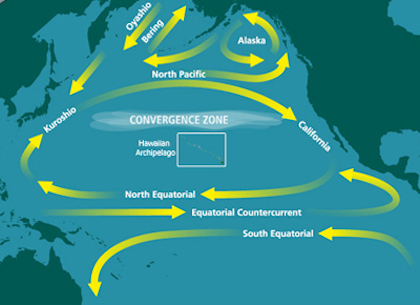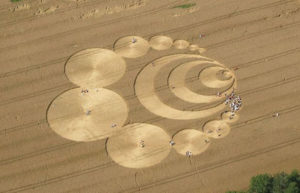Or: Tainted Tuna Tartare

My good friend Jeff Mann, the true Yard Ramp Guy, has asked me to revisit some of my original posts. This week in my From the Archives series: oh, that flotsam and jetsam...

Trash Flow
There's a floating patch of garbage, larger than Texas, in the middle of the Pacific Ocean.
The Pacific Ocean contains huge, slow moving gyre-shaped currents. Debris that drifts into the calm centers of those gyres tend to stay there. It’s similar in some ways to the nearly self-contained gyre that’s the Sargasso Sea but caused by different things.
The debris that drifts into the biggest one, the North Pacific Subtropical Convergence Zone? Bits of plastic.
When you sail into the Great Pacific Garbage Patch, you won't see a lot of chunks of garbage floating around, and you certainly can't walk on it. Instead, the plastic has broken down into tiny particles that float in the upper layers of the water. Fish frequently mistake it for food and often starve, with stomachs full of plastic.
Many other lifeforms find the plastic poisonous, and as the plastics break down, they leak toxic chemicals into the environment, including ones as nasty as PCBs. (Don't read about PCBs unless you really want to freak yourself out, but if you must, click HERE).
There are even bacteria that have learned to eat the plastics, but they end up producing even nastier toxins much of the time.
As the toxic chemicals and plastics are ingested by fish, jellyfish, and other marine animals, they grow increasingly concentrated, up the food chain, as predators eat toxin-laden critters. Many of those predators in turn, like tuna (which are shockingly high up the food chain) contain much higher levels of toxins than the water around them. And then we, the people in this story, eat them. Bon appétit.
The Great Pacific Garbage Patch isn't alone. There is another major gyre in the Pacific, two in the Atlantic, and one in the Indian Ocean. They all contain garbage patches of their own. What are we doing to clean up these patches? Not much yet, other than research, really. There are lots of plans in the air, but not that much funding.
Yard Ramp Guy Blog: Toward Safer Forklifting
This week, my friend The Yard Ramp Guy helps bring clarity to your inclinations.
Click HERE to ramp up.





